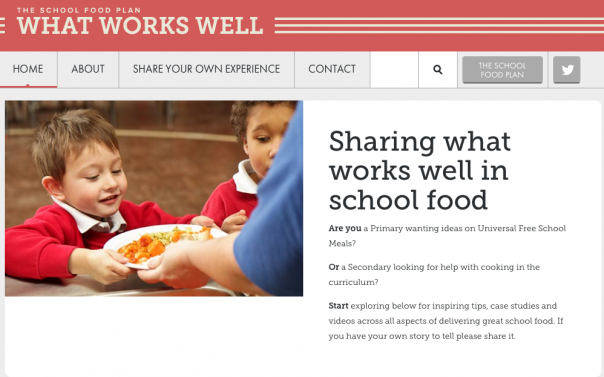
The resource for schools and caterers covers five areas:
* The Food
* Lunchtime Experience
* Learning About Food
* Making It Happen
* Getting Everyone Involved
The website will be regularly updated, and filled with case studies, top tips, and practical advice on how to make school food great.
Topics range from recipes to ideas for cross-curricular activities and the role of sustainable sourcing. Head teachers, governors, cooks, and caterers will be able to share their first hand stories with each other through the website.
The site will direct users to support available from organisations such as the Children’s Food Trust, the Food for Life Partnership, and LACA (the Lead Authority for Catering in Education.
The Times Educational Supplement and the Guardian Teacher Network have also partnered with What Works Well, so that schools can access their content and discussion forums.
For schools preparing for universal infant free school meals, further help is available through a dedicated implementation support service, run by the Children’s Food Trust. You can call their free helpline at 0800 680 0080 or email info@childrensfoodtrust.org.uk
Schools, caterers, parents, and children are encouraged to share their stories of what works well by emailing www@schoolfoodplan.com.
Henry Dimbleby and John Vincent, authors of the School Food Plan, said: “This marks another milestone in the successful delivery of the School Food Plan.
“This September, two of the most significant changes proposed by the School Food Plan will come into effect. All infant pupils will receive free school meals; and practical cookery will be compulsory in the new national curriculum up to age 14.
“However, excellence does not come about by government degree. The policy changes offer a golden opportunity for great school leaders and imaginative cooks to lead a transformation of the food culture in their schools.
“Our job now is to give schools the inspiration and structural support they need to do this.
“While writing the School Food Plan, we hosted seven regional roadshows and visited more than 60 schools. This experience showed us the importance of fostering a mindset of sharing what works well in school food – for every challenge faced, there is a school out there which has already found a solution.
“The What Works Well website gives schools easy access to each other’s ideas, helping them learn from each other’s success stories: great examples and clever ideas. It has been made possible by the scores of schools, caterers, parents, and others who have contributed inspiring content, packed full of useful tips.
“We are grateful for this support and hope others will follow their lead in the spirit of sharing what works well.
“In the School Food Plan, we imagined a new golden age for school food. That dream is closer now than we could have hoped. It’s down to all us to make it a reality.”
Neil Fuller of the Caterlink Foundation said: “The new ‘What Works Well’ platform is a fantastic tool for schools across the country to share best practice and ultimately make the preparation process run as smoothly and efficiently as possible.
“The Caterlink Foundation fully supports the need for schools to work closely together to deliver the School Food Plan, by showcasing existing initiatives and school meal programmes that are already working well.
“Whether a school has set up a school kitchen garden or farm to educate children about the importance of nutrition, worked with local community groups or encouraged parents to get involved in food service, we’re encouraging them to tell us about their successful projects via the online platform to help others move forward and transform their approach to delivering school meals.”
Celebrity chef and school meals campaigner Jamie Oliver added: "One of the best ways for schools to get inspired about the School Food Plan and the new cooking classes coming in September is by seeing what other schools are already doing brilliantly.
“This new website is going to be an invaluable resource for any school over the next few months."